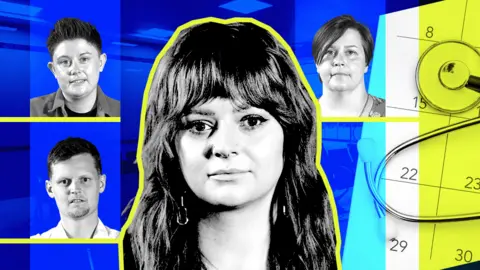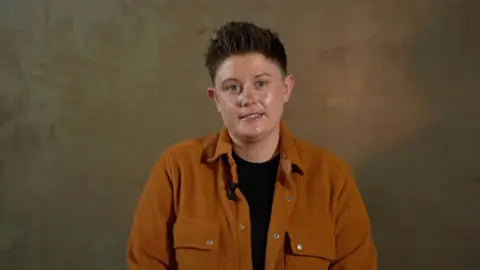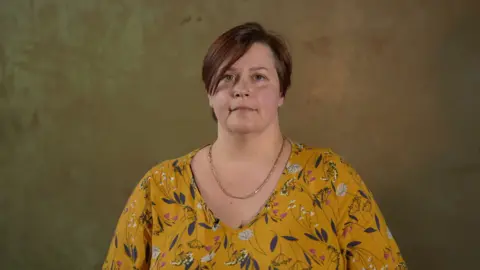 BBC
BBCIt would take more than eight years for the NHS to see all adult patients waiting for ADHD assessments in many parts of the UK, a BBC investigation has found.
Through Freedom of Information requests, the BBC has identified 24 services in that position, and nearly 200,000 people waiting.
The Royal College of Psychiatrists said no-one should be made to wait years for life-changing care.
The new Labour government says delays to ADHD diagnosis are part of a “broken NHS” – which it is working to fix.
The long waits have been caused by rising demand – referrals have increased fourfold since 2019 – and three trusts have closed their waiting lists completely.
The BBC found one trust, Sheffield, has a waiting list of more than 6,000 people and assessed only three patients last year.
Only two providers look able to work through their backlogs in less than a year.
All four governments in the UK say they are working to improve matters.
There is no official list of adult ADHD service providers in the UK, but the BBC understands there are 70. Sixty-six responded to our request for information and 44 gave the BBC enough information to calculate their backlog.
ADHD (attention deficit hyperactivity disorder) is a condition that affects people’s behaviour – making it harder to concentrate and manage time. Acting impulsively and taking risks can also be an issue.
People are only diagnosed if the symptoms cause at least a moderate impact on their lives.

Katie Drinkwater, Rob Reiss, Louise Nichols and Nelly Naylor all wanted to be assessed for ADHD in Sheffield, which has the worst backlogs, according to BBC figures.
They all say they have experienced difficulties since childhood.
Katie says she did well at primary school but “crumpled” at secondary. She was told to stop chatting so much and try harder – but nothing she did seemed to work.
It later took her nine years to complete a part-time degree in health and social care.
“I would just sit there and look out the window, or play with my nails or stare at the walls, get distracted,” Katie says. “[I] just could not do it.”
Rob talks about ADHD as an invisible condition, despite the chaos in his head.
“I come across as quite an ordinary person,” he says, “but the effort that goes into that it is really tiring, it wears me out.”
Louise was diagnosed with school phobia and taken out of mainstream education. In hindsight, she thinks this was linked to ADHD.
Nelly says she went to her GP twice but was told she was suffering from anxiety and depression.
They all agree it’s exhausting to go through life “masking” – camouflaging their symptoms and copying the behaviours of those who don’t have ADHD to try to fit in. It’s something that over the last few years, they all realised they couldn’t carry on doing.
Katie was worried she was going to fail her degree. Rob struggled when he returned to the office as a project manager after lockdown. When Louise became a parent, she felt she wasn’t coping. Nelly felt like she was going to lose her partner and her wedding photography business.
Their GPs agreed to refer each of them for ADHD assessments – but the next step has not been straightforward for any of them.
No official data
Data on how long people are waiting to be assessed for ADHD is not centrally recorded. BBC Verify calculated a national backlog using data from 44 trusts and health boards who told us about both their waiting lists and how many assessments they carried out in 2023.
If these trusts continued working at the same pace, it would take eight years and five months to assess everyone currently on a waiting list.
But the picture varies across the country.
Analysis of the information we received shows there are at least 196,187 people waiting to be assessed. The real number will be higher, because not every trust answered every question.
The figures suggest only two trusts would take less than a year to see all the patients on their waiting list. They are Blackpool Teaching Hospitals NHS Foundation Trust and North East London NHS Foundation Trust, who both told us they have about 500 patients waiting to be assessed.
Northern Ireland does not specifically commission any adult ADHD services, although Belfast Health and Social Care Trust does assessments anyway.
In England, at least four trusts have closed, or partially closed, their waiting list to new referrals. They are:
- Central and North West London NHS Foundation Trust
- Cheshire and Wirral Partnership NHS Foundation Trust
- Oxford Health NHS Foundation Trust
- South London and Maudsley NHS Foundation Trust (partially closed)
Further analysis suggest the number of referrals for ADHD increased fourfold between 2019 and 2023 – rising from about 20,000 to more than 86,000. This came from a smaller number of trusts.

The most extreme example of a backlog is Sheffield Health and Social Care NHS Foundation Trust. It told us it has 6,737 people on its waiting list.
In 2023 it says it carried out three assessments. If work continued at this rate, it would theoretically take 2,246 years to see everyone already waiting.
The trust explained it is prioritising treating people with a valid assessment rather than carrying out new ones.
Although Katie, Rob, Louise and Nelly have all experienced problems there first-hand, when told about the BBC’s findings, they are all visibly taken aback.
“Speechless, devastating,” Louise says, her voice breaking. “I’ve been waiting for two years. Feasibly, it’s not going to happen – I’m not going to get an assessment.”
Suicidal impulses are not generally seen as an ADHD symptom. However, Katie struggled with her mental health when she was on the waiting list.
“I personally tried to take my own life twice before I got my diagnosis, because of the stress and trauma of having to navigate a world that I didn’t understand,” she says.
The Sheffield Trust’s executive medical director, Dr Helen Crimlisk, said: “We are sorry that we have not been providing a good enough service to people seeking help for ADHD. We have prioritised treating people with a valid assessment instead of carrying out new assessments.”
People are also seen for ADHD assessment in community services and primary care, she added. The trust was not able to provide data confirming this.
‘Radical solution’
Thea Stein, chief executive of health think tank the Nuffield Trust, says she has never seen anything like the growth of demand for ADHD services.
She argues thousands and thousands of people are waiting “in distress”, so it is time for a radical solution.
“We’re seeing more people than ever seeking support from ADHD services which are struggling to meet this demand,” the Royal College of Psychiatrists told the BBC.
NHS England says it has “launched an independent expert taskforce which will investigate the challenges facing ADHD services and help them manage the rising numbers of referrals.”
In the meantime, there is no clear solution.
The BBC has spoken to several NHS trusts. Most did not want to go on the record, but some suggest GPs could take over assessing and treating ADHD – something the Royal College of GPs is firmly opposed to.
“The answer can’t be to shift these patients back to general practice,” it said.
Central and North West London, which has more than 11,000 people on its waiting list, is trying something different. It will start working with private practice, and hopes to get through everyone waiting for an assessment in three years.
Right to choose


Back in Sheffield, Louise is still waiting for an ADHD assessment. Katie has paid for private diagnosis and treatment after waiting two years for an NHS assessment.
A friend suggested that Rob choose another mental health provider which is someone’s legal right in some instances under the NHS in England. It took a couple of months for Rob to be seen.
Nelly also opted to do the same, and received an assessment in just over a year.
But there are only a handful of these providers, and some told the BBC waiting times are also getting longer for them, up to 18 months.
Katie, Nelly and Rob all light up when they talk about the difference diagnosis has made to them.
Nelly describes it as “life-changing” and says it has validated her “entire life and existence”. Rob says he has stopped criticising himself and is more productive.
This reflects that ADHD is treatable, with medicine and therapy. The drugs, mostly stimulants, increase activity in the brain, especially the parts which control attention and behaviour.
However, increased global demand and manufacturing issues have caused an ongoing shortage in ADHD medication.
Therapy focuses on giving people the skills to live with the condition, to build coping strategies.
The most important thing for Katie is she can now accept she is not a bad person – her brain just works differently.
“The person I am post-diagnosis is unrecognisable from the person I was before,” she says. “I can accomplish all the things that everyone else can.”
About the data
The BBC gathered the data using FOI requests to NHS trusts and health boards across the UK, mostly in late March 2024.
There is no central list of organisations that provide adult ADHD assessments for the NHS in England. After searching trust websites (apart from those that obviously did not run services, such as ambulance trusts), or contacting press offices, the BBC sent FOIs to 112 providers where it was either confirmed they did run a service – or where it was unclear.
Of these:
- 66 confirmed they ran adult ADHD services, and provided data
- Four did not respond
- 53 gave figures for the number of patients on their waiting list, as of the latest data available. This period was not consistent across trusts
- 45 gave figures on the number of assessments given in 2023
- 44 gave figures for both their waiting list and the number of assessments given in 2023
The backlog calculated using the number of assessments and the waiting list by trust is theoretical. It does not indicate how long patients will have to wait in each area, but does illustrate the scale of the pressures faced by NHS services.


